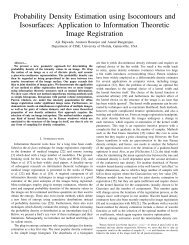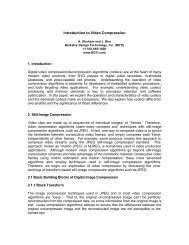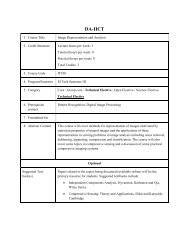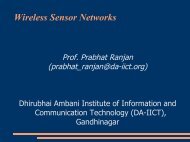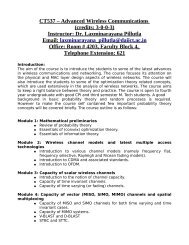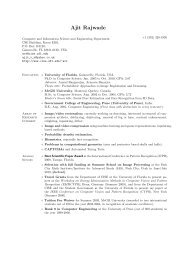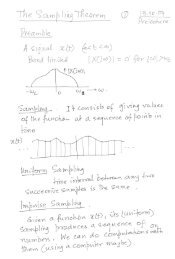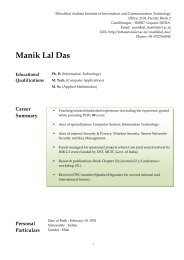View - DAIICT Intranet
View - DAIICT Intranet
View - DAIICT Intranet
You also want an ePaper? Increase the reach of your titles
YUMPU automatically turns print PDFs into web optimized ePapers that Google loves.
protecting his dharma he earned that disgrace that the society has still not been able<br />
to forgive. Every act of dharma raj Yudhishthir is for the protection of dharma.<br />
Dhritarashtra is the only person who could have stopped the game. But he simply<br />
doesn't have the spine to make his own decisions, or stick to them when he does<br />
make them. He puts all of that off onto his son. Rather than guiding his son by being<br />
a moral example, he subtly encourages his son by lack of response to terrible<br />
actions. Dhritarashtra is one of those characters who is so incabable of morality (good<br />
or bad) that he'll put himself as far away from it as possible, by rationalizing or<br />
avoding poor decisions,<br />
The problem was that Vidura was powerless. He can merely advise, exhort, and plead<br />
with the blind Dhritarashtra who, obsessed by his desire that the throne must be his<br />
son Duryodhana’s, is deaf to all appeals. In the very beginning of the epic we are told<br />
that the Kauravas are a giant tree of passion whose root is the weak-minded<br />
Dhritarashtra. Its seed is infatuation; its branches are anger and pride rooted in<br />
ignorance. Or even pretending he doesn't understand it at all.<br />
Bhishma’s failure as a leader of the polity lies in his never having practiced the rajadharma<br />
he speaks of at length to Yudhishthira on his bed-of-arrows which seems to<br />
become his penance for inaction. In a Kshatriya the “witness” stance only brings<br />
about the destruction of the policy. The Kshatriya must use power to protect the<br />
rights of the weak, for that is his dharma, the truth of his nature. To abjure this<br />
because of a self-imposed vow and turn into the “egotistical sublime” of the age<br />
brings destruction and misery in its wake not only for oneself, but also for the entire<br />
society of which such a person is the corner stone, the pillar of strength.<br />
Karna might appear to be nobility and generosity personified, but actually he is eating<br />
his heart out in envy and every act of his is triggered by a sense of deeply injured<br />
merit, a hyper-sensitivity about his low caste, which goes so far as to drive him to bid<br />
a princess to be stripped in public and to term her a prostitute.<br />
The question would be asked "Why did Bhishma, Dronacharya, and Vidura not desert<br />
the evil company of king Dhritarashtra and join the Pandavas?" The answer is given<br />
by Bhishma himself. He had vowed to remain loyal to the throne of Hastinapur<br />
8



